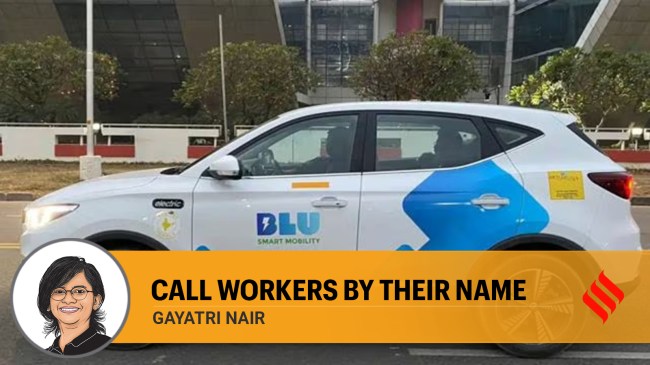Opinion BluSmart drivers’ strike: Call workers by their name
The strike highlights need for safeguards in the platform-based sector
 BluSmart drivers’ strike highlights need for safeguards in platform-based sector
BluSmart drivers’ strike highlights need for safeguards in platform-based sector The platform economy is beset by a crisis. Strikes, protests and termination of workers have become a frequent feature of the sector: Urban Company terminated the services of many of its workers in 2023, and Blinkit workers went on strike in Varanasi last month demanding better pay and cotton uniforms. However, the dispersed nature of these actions across cities has prevented them from becoming a national conversation. This is at odds with the recent public discussion over the closure of BluSmart in April. It has taken a protest by BluSmart drivers to draw attention to what failure has meant for those who make a platform — its workers.
The drivers are protesting the sudden loss of work, and the absence of severance pay or alternate jobs. Much like BluSmart drivers, platform workers across sectors remain without minimal guarantees of due process either when platforms shut down or in cases of termination. BluSmart drivers have also raised a demand for state intervention in the sector.
The relationship between the state and platforms in India has been built on an alignment in their views on jobs and empowerment. Constructed around the ideals of “self-reliance” and entrepreneurship, both consider platform-based work to be a desirable move away from traditional employment forms that tie employers and employees into a legal relationship. Platforms champion the idea that their workers are not employees but independent “partners” who enter into a business rather than an employment arrangement. Such a view enables platforms to offer services through the labour of workers while demanding compliance with rules including wearing a uniform, following time schedules for deliveries, and even determining when and how they can cancel a job. Termed “partners”, workers must bear numerous costs, such as paying for their vehicles, purchasing equipment for use in home service platforms, and attendant costs of phones and data, all while paying high commission rates to platforms. They receive little protection from religious or caste-based discrimination, and there are hardly any attempts to address women’s access to safe public spaces and toilets.
BluSmart was unique: The platform owned the cars, undertook training programmes for women drivers, and even offered minimum guaranteed incomes to its workers. Yet when the crisis hit, drivers were left without protection. The state and political parties’ response has taken two forms: A legal framework for recognising social security rights of platform workers (bills have been passed in Rajasthan and cleared in Karnataka, while Telangana has prepared a draft bill), and an alternative cooperative platform model, which passes on earnings in their entirety to workers without charging a commission.
These alternatives address important needs. What remains missing is a focus on everyday work conditions. Many platforms have impossibly high standards that they expect workers to maintain (a rating of 4.7 out of 5), failing which they are either dismissed or must pay the platform to be trained again for the same job. Long hours of work have become the norm, with workers across platforms reporting 12-hour-plus work days. Coupled with exposure to extreme weather, the impact on physical and mental health has been significant. Platforms have claimed that workers are well paid, with the freedom to decide when to work and for how long — but with rates decided by platforms, how many hours must one work to secure minimum or living wages? Severe restrictions on cancelling jobs, even if due to poor health, an injury, a family crisis or when it is not remunerative, means workers have little choice in how they work. Such restrictions make it evident that platforms do what any other employer does — only through apps and algorithms.
Tackling this requires significant interventions in how platforms currently operate, which will upturn the current platform model. At present, neither can workers exercise real choice in their work conditions as an entrepreneur does nor do they have safeguards. In considering platform workers as “partners”, both platforms and the state are not only misclassifying, but effectively considering the platform worker to be on the same footing as the owner of a platform. The BluSmart crisis makes it evident that this is not the case. The state needs to hold platforms accountable to existing laws, within which there is established precedent to consider platforms as employers, especially since they remain competitive through the control of a large and poorly paid labour force rather than through technological innovation.
The writer is assistant professor, Department of Social Sciences and Humanities, IIIT Delhi






